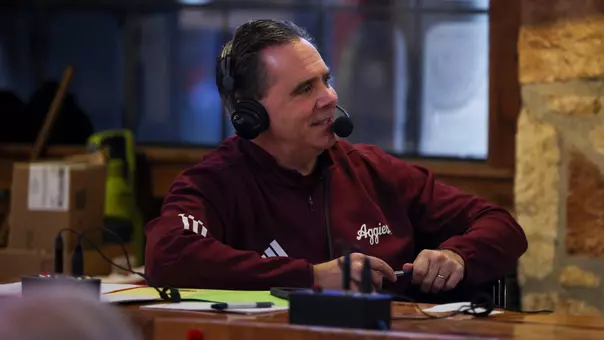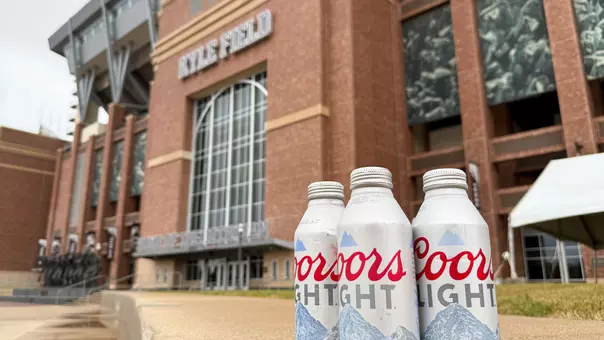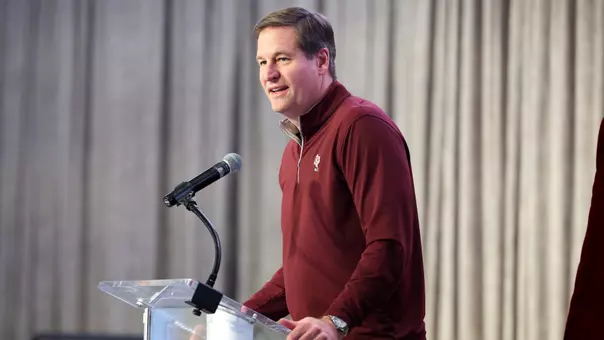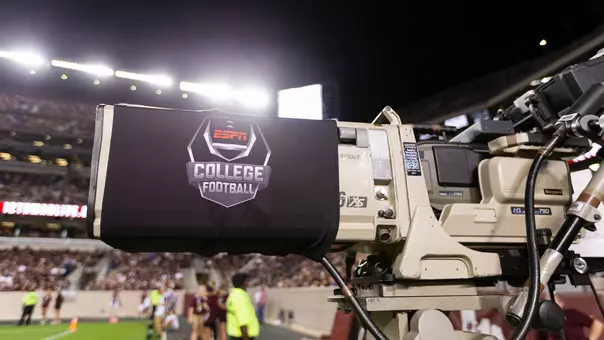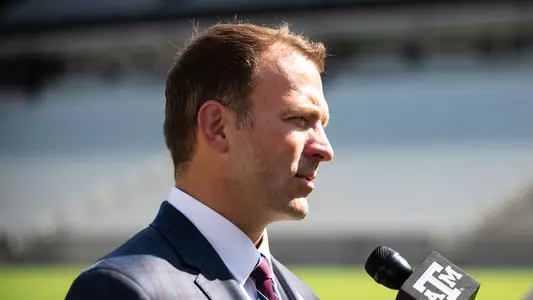
Photo by: Craig Bisacre/Texas A&M Athletics
Bjork Gives Latest Update on Wednesday's Studio 12
Jul 15, 2020 | General
Athletics Director Ross Bjork stopped by Studio 12, the department's official radio show and podcast, on Wednesday to provide fans and the public with the latest in the effect of the COVID-19 pandemic on not only Texas A&M Athletics but the collegiate landscape in general.
Bjork touched on a wide variety of topics--everything from Monday's in-person meeting in Birmingham, to calendar checkpoints, to scheduling scenarios and much more.
Download the podcast and all Aggie podcast content to your computer or mobile device automatically for free--visit 12thman.com/podcast to subscribe.
"A lot of (the task force's recommendations) are already on the table with how we're operating already," Bjork said. "But we talked a lot about testing protocol and what that will look like during the season. How do we test, not only our team, but also the opponent? How do the officials get tested? What happens on the sideline? What do the coaches have to do to not only protect themselves but protect the players? We heard a great report from them."
With a wide variety of scenarios possible for the fall seasons to follow (not just football but soccer, volleyball and cross country), one thing he was sure to point out was that as of this moment—understanding things can change at any time—the Aggies are planning to take Kyle Field on September 5.
"Look, everything is on the table. You have to consider everything. Right now, the only thing that we know is that no one has told us we cannot play. But we also haven't been given the green light, per se. We're proceeding, but we've not necessarily been told 'you have permission to do this'. And we need that permission at some point in time."
No decision on the fall seasons came out of the SEC meetings, other than the slight adjustment of moving the start date of soccer, volleyball and cross country to at least August 31. Time, Bjork says, is still on the schools' side, but with every passing day that window grows smaller.
"At the end of the day, we still have some time. 'Some' is the key word. We understand that time is ticking. We know big decisions have to be made, but let's see where the data goes and what society allows us to go forward with.
"Right now, this is a serious matter. It's a health crisis. We have to take it seriously, but we have to have the pragmatic approach and the attitude that we are all in this together, and this is about the health and safety of our student-athletes.
"That was the nature of the meetings."
Coming out of the SEC meetings, Bjork points out that that's not necessarily how the league's leaders are looking at it—still yet-to-be-released data could look better in the coming weeks, or could look worse. No one knows.
"In our minds, the end of July is more of a checkpoint. It may be a decision point, or it may just be a checkpoint. Since we start training camp for football, soccer and volleyball the next week, (the end of July) could be decisions, or you could say, 'Hey, we need a few more data points'. Or, 'Things are trending in the right direction. Let's wait a little longer'. So we have some time to get more data points, and that's really the key thing Commissioner Sankey was talking about coming out of Monday."
From Bjork's perspective, success in the professional leagues in the coming weeks will be key and should have an impact on college athletics' next steps.
"The way I look at it is that we need controlled environments and we need as safe as possible optics. We need the NBA to have their bubble work, even though we aren't doing 'bubbles' per se. This weekend, Texas Motor Speedway has a race. We need that. We need fans and we need those optics in as safe as possible an environment. That helps that social permission, that public permission that is going to be part of it."
Bjork says that while data, health and safety are clearly highly important, societal permission plays a huge part in the equation of getting back on the fields and courts.
Which brings up maybe the most important point of all…who 'grants' that permission? From league personnel, to local and state officials, to campus leaders…there isn't an easy answer.
"We don't necessarily have the permission yet to proceed, and the question is who gives us that permission? That's really the ultimate question. The Presidents and Chancellors in the SEC are the ultimate decision-making authority. You have Commissioner Sankey. You have the Medical Advisory Task Force. The SEC is consulting with NFL Experts and other medical personnel.
"Locally, we have our Dean of the School of Public Health, Dr. Shawn Gibbs. We have Dr. Gerry Parker, who's a pandemic expert over in the Bush School. I met (Tuesday) with the Brazos County Health Department. You have governors (of states)…it's a multi-layer decision.
"At the end of the day, who has that permission and who grants it? Or are you gathering intel from everybody and you say as the SEC we are moving forward, even though the rest of college sports may not be on the same page? Is the SEC out there by ourselves? Are we doing something no one else is doing, or are we providing leadership? It's a fascinating deal.
"It's not the CDC either. We know part of this is becoming politicized. We know that layer is in there. That's where we need a national strategy. We wish there was one entity that could give the green light. But right now, as athletic administrators, our job is to play games…host these opportunities…and we have to collect as much data as we possibly can and make hopefully the right decisions based on that data."
Bjork, who has strong relationships with many ADs around the country including at Colorado and Fresno State—both on the Aggies' 2020 schedule—said that these things were anticipated and many conversations had already taken place.
The frequency of those conversations, as one might expect, has grown over the last few days.
"I had a lot of scheduling conversations over the weekend. There's lots of ADs that are scrambling right now. Look, opponents will not be hard to find. That will not be the issue. Finding the game piece will not be the hard part."
Texas A&M is still contracted to play Arkansas at Arlington's AT&T Stadium. If, for example, the SEC moved to a conference-only model, that might leave the Aggies with just three home games. Could that venue change?
"We would need that game on campus. You guys know my philosophy on that game long-term. To me, that game should be on campus anyway. But if something were to happen this year, we'd do everything we can to move that game to our campus. This year it's our home game.
"That dialogue has already started with (Arkansas AD) Hunter (Yurachek). But because things are so fluid, you don't have to make any decisions right now. You put things on the table, you talk about what-if scenarios. The rabbit holes you can go down are pretty fascinating. You just have to think of everything and that's what we've been trying to do."
"We don't know how long the virus will be out there. Who knows what the medical timelines (vaccines, treatments) will be? For college sports, we really need to contain this into a one-year situation. It needs to be a one-year financial situation at the deepest, most severe level. It needs to be (a one-year situation) relative to competition and schedules."
He also makes sure to point out that there is a mental-health fallout of this as well from a student-athlete perspective.
"They are hurting right now. They need an outlet. They need some normalcy. So we need to contain this, we need to get our arms around this, and that's what we're all striving for.
"We're working every day to try and figure out the best pathway forward. That's our job. If we don't believe as Athletic Directors, and don't put our athletes in the safest possible environment, then who will? That's what we're focused on."
"Every Aggie should be blessed that we are in the SEC," Bjork said. "We are in a leadership position nationally. I know that other conferences are looking at the SEC waiting to understand what we are going to do. I know that for a fact.
"That's the great thing about our position. That's the great thing about our University…that Aggie Spirit, that can-do attitude. Never give up. We are in a great position to be in the driver's seat, and if anyone can get through this, we can."
content copyright 2020, Texas A&M Athletics. Redistribution or reproduction without written consent of Texas A&M Athletics is prohibited.
Bjork touched on a wide variety of topics--everything from Monday's in-person meeting in Birmingham, to calendar checkpoints, to scheduling scenarios and much more.
Download the podcast and all Aggie podcast content to your computer or mobile device automatically for free--visit 12thman.com/podcast to subscribe.
Click Here to listen to the full interview.
Recapping the SEC Meeting
Bjork and the league's other 13 Athletics Directors met in person at league HQ in Birmingham on Monday. As you might imagine, a wide variety of topics were discussed—including the latest from the league's return to activity medical task force."A lot of (the task force's recommendations) are already on the table with how we're operating already," Bjork said. "But we talked a lot about testing protocol and what that will look like during the season. How do we test, not only our team, but also the opponent? How do the officials get tested? What happens on the sideline? What do the coaches have to do to not only protect themselves but protect the players? We heard a great report from them."
With a wide variety of scenarios possible for the fall seasons to follow (not just football but soccer, volleyball and cross country), one thing he was sure to point out was that as of this moment—understanding things can change at any time—the Aggies are planning to take Kyle Field on September 5.
"Look, everything is on the table. You have to consider everything. Right now, the only thing that we know is that no one has told us we cannot play. But we also haven't been given the green light, per se. We're proceeding, but we've not necessarily been told 'you have permission to do this'. And we need that permission at some point in time."
No decision on the fall seasons came out of the SEC meetings, other than the slight adjustment of moving the start date of soccer, volleyball and cross country to at least August 31. Time, Bjork says, is still on the schools' side, but with every passing day that window grows smaller.
"At the end of the day, we still have some time. 'Some' is the key word. We understand that time is ticking. We know big decisions have to be made, but let's see where the data goes and what society allows us to go forward with.
"Right now, this is a serious matter. It's a health crisis. We have to take it seriously, but we have to have the pragmatic approach and the attitude that we are all in this together, and this is about the health and safety of our student-athletes.
"That was the nature of the meetings."
End of July: A Decision Deadline?
A lot of national reports point at the last portion of July as almost a drop-dead date for the future of the fall sports seasons.Coming out of the SEC meetings, Bjork points out that that's not necessarily how the league's leaders are looking at it—still yet-to-be-released data could look better in the coming weeks, or could look worse. No one knows.
"In our minds, the end of July is more of a checkpoint. It may be a decision point, or it may just be a checkpoint. Since we start training camp for football, soccer and volleyball the next week, (the end of July) could be decisions, or you could say, 'Hey, we need a few more data points'. Or, 'Things are trending in the right direction. Let's wait a little longer'. So we have some time to get more data points, and that's really the key thing Commissioner Sankey was talking about coming out of Monday."
Optics Matter
One of the perhaps less talked about things in relation to the future of the fall sports seasons is public perception. Everyone has seen the videos and photos of large pool and lake parties, huge groups gathering without social distancing, and so forth—and all of that will have an impact on the fall seasons.From Bjork's perspective, success in the professional leagues in the coming weeks will be key and should have an impact on college athletics' next steps.
"The way I look at it is that we need controlled environments and we need as safe as possible optics. We need the NBA to have their bubble work, even though we aren't doing 'bubbles' per se. This weekend, Texas Motor Speedway has a race. We need that. We need fans and we need those optics in as safe as possible an environment. That helps that social permission, that public permission that is going to be part of it."
Bjork says that while data, health and safety are clearly highly important, societal permission plays a huge part in the equation of getting back on the fields and courts.
Which brings up maybe the most important point of all…who 'grants' that permission? From league personnel, to local and state officials, to campus leaders…there isn't an easy answer.
"We don't necessarily have the permission yet to proceed, and the question is who gives us that permission? That's really the ultimate question. The Presidents and Chancellors in the SEC are the ultimate decision-making authority. You have Commissioner Sankey. You have the Medical Advisory Task Force. The SEC is consulting with NFL Experts and other medical personnel.
"Locally, we have our Dean of the School of Public Health, Dr. Shawn Gibbs. We have Dr. Gerry Parker, who's a pandemic expert over in the Bush School. I met (Tuesday) with the Brazos County Health Department. You have governors (of states)…it's a multi-layer decision.
"At the end of the day, who has that permission and who grants it? Or are you gathering intel from everybody and you say as the SEC we are moving forward, even though the rest of college sports may not be on the same page? Is the SEC out there by ourselves? Are we doing something no one else is doing, or are we providing leadership? It's a fascinating deal.
"It's not the CDC either. We know part of this is becoming politicized. We know that layer is in there. That's where we need a national strategy. We wish there was one entity that could give the green light. But right now, as athletic administrators, our job is to play games…host these opportunities…and we have to collect as much data as we possibly can and make hopefully the right decisions based on that data."
Schedule Fluidity
It became obvious as the months progressed that the possibility of football schedule changes would be very high. While Texas A&M has not yet been affected as much as say a Notre Dame or a BYU or a Hawai'i has, the Aggies are not without impact—as Colorado's trip to Kyle Field on September 19 was cancelled over the weekend.Bjork, who has strong relationships with many ADs around the country including at Colorado and Fresno State—both on the Aggies' 2020 schedule—said that these things were anticipated and many conversations had already taken place.
The frequency of those conversations, as one might expect, has grown over the last few days.
"I had a lot of scheduling conversations over the weekend. There's lots of ADs that are scrambling right now. Look, opponents will not be hard to find. That will not be the issue. Finding the game piece will not be the hard part."
Texas A&M is still contracted to play Arkansas at Arlington's AT&T Stadium. If, for example, the SEC moved to a conference-only model, that might leave the Aggies with just three home games. Could that venue change?
"We would need that game on campus. You guys know my philosophy on that game long-term. To me, that game should be on campus anyway. But if something were to happen this year, we'd do everything we can to move that game to our campus. This year it's our home game.
"That dialogue has already started with (Arkansas AD) Hunter (Yurachek). But because things are so fluid, you don't have to make any decisions right now. You put things on the table, you talk about what-if scenarios. The rabbit holes you can go down are pretty fascinating. You just have to think of everything and that's what we've been trying to do."
Financial Impact
Clearly college football is by far the biggest driver of collegiate athletic departments, and Texas A&M is no different. Bjork says no matter what happens this season, administrators and leaders have to find a way to keep this disruption inside a one-year window."We don't know how long the virus will be out there. Who knows what the medical timelines (vaccines, treatments) will be? For college sports, we really need to contain this into a one-year situation. It needs to be a one-year financial situation at the deepest, most severe level. It needs to be (a one-year situation) relative to competition and schedules."
He also makes sure to point out that there is a mental-health fallout of this as well from a student-athlete perspective.
"They are hurting right now. They need an outlet. They need some normalcy. So we need to contain this, we need to get our arms around this, and that's what we're all striving for.
"We're working every day to try and figure out the best pathway forward. That's our job. If we don't believe as Athletic Directors, and don't put our athletes in the safest possible environment, then who will? That's what we're focused on."
The Gift of SEC Membership
It proves itself year in and year out to Aggies…but in these unprecedented times, there is no better place to call home than the Southeastern Conference."Every Aggie should be blessed that we are in the SEC," Bjork said. "We are in a leadership position nationally. I know that other conferences are looking at the SEC waiting to understand what we are going to do. I know that for a fact.
"That's the great thing about our position. That's the great thing about our University…that Aggie Spirit, that can-do attitude. Never give up. We are in a great position to be in the driver's seat, and if anyone can get through this, we can."
content copyright 2020, Texas A&M Athletics. Redistribution or reproduction without written consent of Texas A&M Athletics is prohibited.
Fightin' Texas Aggie Band Halftime: Florida
Saturday, October 11
Fightin' Texas Aggie Band Halftime: Mississippi State
Saturday, October 04
Fightin' Texas Aggie Band Halftime: Auburn
Saturday, September 27
Fightin' Texas Aggie Band Halftime: Utah State
Saturday, September 06
